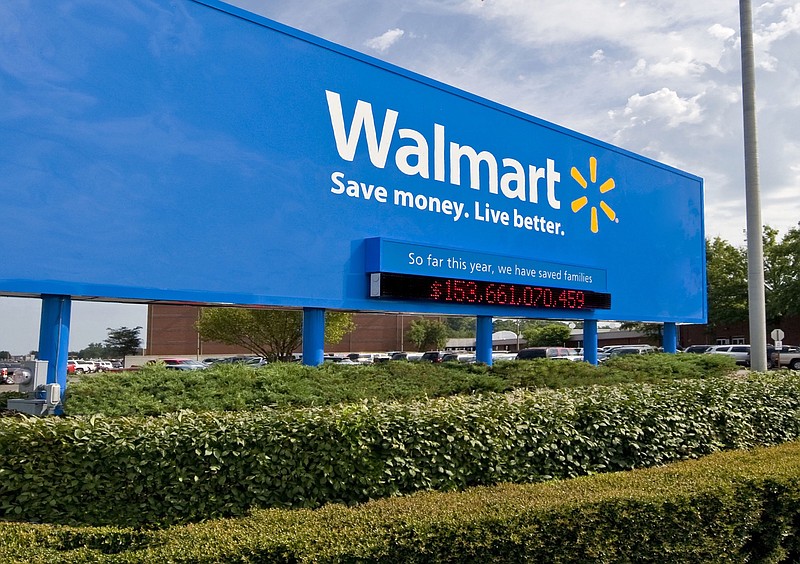Walmart has been ordered to pay $115 million to a Silicon Valley agricultural technology company that sued the retailer, accusing it of misappropriation of confidential information and trade secrets related to development of Walmart's "Eden" system, which is used to manage the freshness of produce and proteins.
Zest Labs Inc., based in San Jose, Calif., and its parent company, Ecoark Holdings Inc., based in Rogers, filed the lawsuit in 2018 in U.S. District Court in Little Rock, saying that Walmart asked the company to test out its "Zest Fresh" freshness management system, then stole the technology and used it to develop its own system.
The trial before U.S. District Judge James M. Moody Jr. was conducted under seal because of the volume of trade secrets and proprietary information that was discussed during the proceedings. The verdict was announced Friday afternoon.
The complaint said Walmart and Zest Labs -- which was then known as Intelliflex Corp. -- began discussions in early 2014 about possible solutions for an industrywide food waste problem -- known in the grocery industry as "Fresh Food Shrink."
In the original complaint, Zest Labs said the company began development of Zest Fresh in 2010, and in early 2014 began talks with Walmart to analyze the retailer's food shrink problem, which Zest Labs estimated totaled some $3 billion annually in food losses.
According to a Zest Labs presentation on its website, Zest Fresh uses sensors to track perishable food shipments from farms and processors through the supply chain to the store shelves while relaying data that measures in real time the levels of freshness of any given shipment. It also uses predictive analytics to generate dynamic use-by dates on each pallet. By doing so, the company said, retail shrink can be reduced by more than half by helping to factor in the variables associated with perishable foods and giving retailers options in scheduling and routing.
On March 5, 2014, the complaint said, Zest Labs and Walmart entered into a confidentiality agreement and document of understanding.
In 2016, Walmart committed to a pilot program and deployment of the Zest Fresh technology, which ran through April 2017, during which time, the complaint said, a large number of Walmart employees had direct access to Zest Labs' trade secret technology.
In November 2017, the complaint said, Walmart abruptly canceled the agreement and four months later announced the Eden system, which Zest Labs said "looks, sounds, and functions very similarly" to its product, and was developed using proprietary technology and trade secrets that the retailer was privy to from 2014-17.
According to the interrogatories and verdict forms filed Friday in U.S. District Court, the jury found that Walmart willfully and maliciously engaged in misappropriation of trade secrets, violated the two companies' 2015 nondisclosure agreement, and fraudulently induced the tech company into a statement of work that Walmart filed a counterclaim accusing Zest Labs of breaching. According to the court records that counterclaim was not upheld by the jury.
The jury awarded Zest Labs $60 million in compensatory damages, $50 million in exemplary damages, and $5 million for breach of the non-disclosure agreement.
Although the $115 million verdict is nowhere near the $2 billion in damages Zest Labs originally sought, Randy May, CEO of Ecoark Holdings, said the company was satisfied with the verdict and that the damage award was supported by the evidence put on at trial.
"We believe this was one of the largest -- if not the largest -- awards against Walmart by a jury in Arkansas" May said in an email in response to questions by the Arkansas Democrat-Gazette.
Although Walmart was not specifically enjoined from continuing to use Zest Labs' technology, May said the door was left open for further legal action from the company to discourage unlicensed use of its technology.
"We plan to file an appeal of some of the Judge's pre-trial rulings to make sure that Walmart is held fully accountable for its actions," May said in the email. "The appeal will allow Ecoark and Zest to seek additional liability and damages findings against Walmart to ensure that innovative businesses are protected from misappropriation of their technologies."
He said the company plans to file post-trial motions seeking payment of attorneys' fees and court costs, as well.
On Saturday, a Walmart spokesman responded to a request for comment from the Democrat-Gazette with a prepared statement saying that the retailer plans to file post-trial motions of its own and is considering what steps it will take next.
"Walmart values its business relationships and respects the intellectual property rights of others," said Randy Hargrove, senior director of national media relations for Walmart in an email. "We have policies in place to prevent the inappropriate use of third-party assets. We believe the jury's verdict is excessive, not supported by the facts and should be set aside."
May said that although Walmart could appeal the verdict, he and his company do not believe a basis for a successful appeal exists.
"Doing so will only confirm that the judgment was proper," he said. "Intellectual property is key to America's modern economy. The jury understood that protecting trade secrets is the right thing to do and critical to future business operations in Arkansas."
"Walmart may try to delay justice, but we will continue to aggressively pursue this case and enforce our IP rights against Walmart and any other company that violates them."

